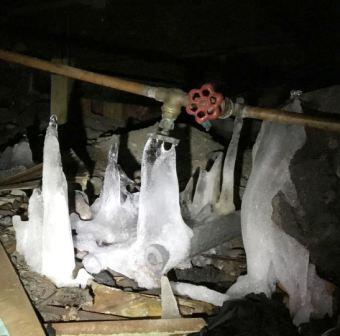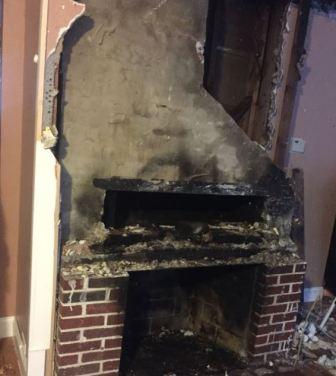Prepare Your Home For The Cold Winter Months
As the days grow shorter and temperatures start to drop, it’s time for homeowners to think about preparing their properties for the colder months ahead. Fall is the perfect season to get your home ready for winter, ensuring that it remains safe, warm, and free from the common risks of water damage and fire damage. At ServiceMaster Dynamic Cleaning, we’ve seen firsthand how devastating these damages can be, but with the right precautions, you can protect your home.
Water Damage Prevention Tips
Water damage is one of the most common issues we see during the colder months, often caused by frozen pipes, roof leaks, or improper drainage. Here’s how you can prevent water damage in your home:
- Clean Your Gutters and Downspouts: Fallen leaves and debris can clog your gutters, causing water to back up and potentially seep into your home through groundwater or ice dams. Before winter arrives, take the time to clean your gutters and ensure your downspouts are directing water away from your foundation. This simple task can prevent costly water damage to your basement.
- Inspect Your Roof: Missing or damaged shingles can allow water to penetrate your home, leading to leaks and water damage. Take advantage of the mild fall weather to inspect your roof and make any necessary repairs. If you’re unsure about climbing up, consider hiring a professional to ensure your roof is in good condition before winter.
- Seal Cracks and Gaps: Walk around your home and look for any cracks in the foundation or gaps around windows and doors. These openings allow water to seep into your home, especially during heavy rain or snowmelt. Use caulk or weather stripping to seal these areas and keep water out.
- Check Your Sump Pump: If your home has a basement, a sump pump is your first defense against flooding. Make sure your sump pump is in good working order before the winter months. Test it by pouring a bucket of water into the sump pit; if it doesn’t activate, it may need maintenance or replacement.
- Insulate Pipes: Frozen pipes are a leading cause of water damage during winter. Pipes in unheated areas like basements, attics, or crawl spaces are especially vulnerable. Insulate these pipes with foam pipe insulation to prevent them from freezing and bursting. Don’t forget to drain your outdoor hoses and turn off the water to the spigot.
Fire Damage Prevention Tips
Fire damage is another significant risk during winter when heating systems are in use and holiday decorations abound. Here’s how you can minimize the risk of fire damage in your home:
- Service Your Heating System: Schedule a professional inspection before using your furnace or boiler regularly. A well-maintained heating system is more efficient and less likely to cause a fire or puff back. Replace any dirty filters and ensure that all components are functioning correctly.
- Clean Your Chimney: If you have a fireplace, it’s essential to have your chimney cleaned annually. Creosote buildup can ignite and cause a chimney fire, leading to extensive fire damage. Hire a professional chimney sweep to clean and inspect your chimney before you begin using your fireplace for the season.
- Inspect Electrical Systems: Faulty wiring is a common cause of house fires. Check for frayed cords, loose outlets, or flickering lights. If you notice anything unusual, have a licensed electrician inspect your home’s electrical system. It’s better to address potential issues now than face the risk of fire damage later.
- Use Space Heaters Safely: Space heaters are a convenient way to warm up a room, but they can also be a fire hazard if not used correctly. Always place space heaters on a flat, non-flammable surface, and keep them at least three feet away from anything that can burn. As you pull them out of storage, clean and remove any dust or debris and check for frayed or worn cords.
- Check Smoke Alarms and Carbon Monoxide Detectors Test your smoke detectors to ensure they are working properly. Check and replace batteries. Smoke detectors usually last 10 years and CO detectors typically last for 6 years.
Disaster Restoration Services
At ServiceMaster Dynamic Cleaning, we’ve helped countless homeowners recover from water and fire damage. We’ve seen how devastating these events can be. For example, one winter, we responded to a home where a pipe had burst in the attic, causing significant water damage throughout the house. The homeowner had forgotten to insulate the pipes, leading to freezing and eventual rupture.

In another case, we were called to a home that had suffered a chimney fire. The homeowners had neglected to have their chimney cleaned for several years, and creosote buildup had ignited, causing extensive fire damage to the living room. Fortunately, we were able to restore the property, but the incident serves as a reminder of the importance of regular maintenance.

By taking these preventative measures, you can protect your home from the risks of water damage and fire damage during the colder months. At ServiceMaster Dynamic Cleaning, we’re here to help if disaster strikes, but with a little preparation, you can keep your home safe all winter long. Don’t wait until it’s too late—start your fall maintenance tasks today and enjoy peace of mind knowing your home is ready for whatever winter brings. If you do experience water or fire damage, we can help. Our team of professionals is available for emergency disaster restoration services 24/7/365. Contact us today.

